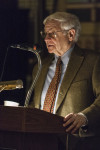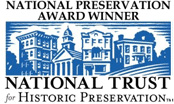2017 Dick Wolf Lecture – Adapting to Sea Level Rise
Posted on April 1st, 2017
Kelsey Robertson, winner of the 2017 Dick Wolf Prize, presented Historic Districts & Climate Change: examining the vulnerability of the District’s historic districts to sea level rise, Friday, March 24, 2017, 7 p.m., at Hill Center, 921 Pennsylvania Ave SE. Presentation Slides Event photos
The winner of the 2017 Dick Wolf Memorial Lecture competition is Kelsey Robertson, who received her Master of Arts degree in Urban & Regional Planning from Georgetown University in December,2016. Kelsey’s lecture is based on her Master’s thesis that explores the vulnerability of historic districts to climate change and sea level rise and identifies adaptation planning mechanisms to increase climatic resilience without significantly diminishing the integrity of the built and cultural environment of these historic districts. She currently works in government affairs at AVANGRID, a national renewable energy developer and operator of regulated utilities. Prior to AVANGRID, Kelsey spent several years at the American Wind Energy Association. In 2009, Kelsey graduated summa cum laude from Connecticut College where she majored in International Relations. Kelsey originally hails from Westport Island, Maine.
Following Kelsey’s presentation, a panel of three special guests discussed the lecture: Tommy Wells, Director of the Department of Energy and Environment, Tanya Stern, Deputy Director, Planning, Engagement and Design, DC Office of Planning, and Gretchen Pfaehler, Architectural Historian, Member and former Chair of the Historic Preservation Review Board.
For over 60 years, the Capitol Hill Restoration Society (CHRS) has championed the interests of residential Capitol Hill by working to preserve its historic character and enhance its livability through efforts in planning, zoning, traffic management, and public safety. The Dick Wolf Memorial Lecture is an annual event sponsored by CHRS to showcase excellence in research and writing on urban planning and historic preservation in the District of Columbia by a student or intern. The winner presents a lecture on his or her research and receives a $1,000 prize.
Dick Wolf (1933-2012) was one of the District’s most ardent and effective visionaries. After moving to Capitol Hill in 1964, he worked tirelessly and effectively on community planning (including the Comprehensive Plan), historic preservation, and sound neighborhood development. He served on the CHRS Board for many years, most often as President, and also served on the Committee of 100 of the Federal City. His vision for Washington was of a great, world-class city that houses both the nation’s great institutions as well as families with young children; balances its appetite for massive growth with preservation of the character of its irreplaceable historic residential neighborhoods; and integrates sound, sustained city planning principles, practices and administrative processes into all the city’s business.



